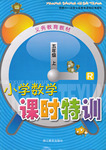题目内容
______ toothache, the old man felt very bitter, having no good sleep.
A. Not being rid of B. Not ridding of
C. Not rid of D. Not having rid of
C

 小学课时特训系列答案
小学课时特训系列答案Do you know of anyone who uses the truth to deceive(欺骗)? When someone tells you something that is true,but leaves out important information that should be included, he can give you a false picture.
For example,someone might say, “I just won a hundred dollars on the lottery(彩票). It was great. I took that dollar ticket back to the store and turned it in for one hundred dollars!”
This guy's a winner,right? Maybe,maybe not.We then discover that he bought $ 200 worth of tickets,and only one was a winner.He’s really a big loser!
He didn’t say anything that was false,but he left out important information on purpose.That’s called a half-truth.Half truths are not technically lies,but they are just as dishonest.
Some politicians often use this trick.Let’s say that during Governor Smith’s last term,her state lost one million jobs and gained three million jobs.Then she seeks an other term.One of her opponents(对手)says,“During Governor Smith’s term,the state lost one million jobs!” That’s true.However,an honest statement would have been,“During Governor Smith's term,the state had a net gain of two million jobs.’’
Advertisers will sometimes use half—truths.It’s against the law to make false statements so they try to mislead you with the truth.An advertisement might say,“Nine out of ten doctors advised their patients to take Yucky Pills to cure toothache.”It fails to mention that they only asked ten doctors and nine of them work for the Yucky Company.
This kind of deception happens too often.It’s a sad fact of life:Lies are lies,and sometimes the truth can 1ie as well.
1.How much did the lottery winner lose?
|
A.one hundred dollars. |
B.Two hundred dollars. |
|
C.Three hundred dollars. |
D.Four hundred dollars. |
2.We may infer that the author believes people should ________.
|
A.buy lottery tickets if possible |
B.make use of half—truths |
|
C.be careful about what they are told |
D.not trust the Yucky Company |
3. How many examples does the writer give to show how the truth is used to deceive?
|
A.One. |
B.Two. |
C.Three. |
D.Four. |
4.Which of the following is true according to the passage?
|
A.Using half truths is against the law. |
|
B.Technically,half truths are in fact lies. |
|
C.Yucky Pills is a very good medicine for toothache. |
|
D.Governor Smith did a good job during her last term. |
5.Which of the following best expresses the main idea of the passage?
|
A.He’s really a big loser! |
|
B.Sometimes the truth can lie as well. |
|
C.Advertisers will sometimes use half truths. |
|
D.It’s against the law to make false statements. |